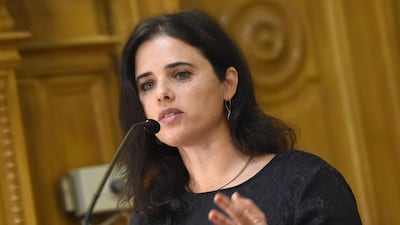JERUSALEM // Israeli ministers have approved a bill that would allow a court to order sites such as Facebook and YouTube to remove material found to be “incitement”, which they allege contributes to Palestinian violence.
A panel of ministers approved the legislation on Sunday and it will now be taken up by the country’s parliament.
Government watchdogs and Palestinians have expressed concern that such a law could be abused and lead to censorship of legitimate information.
The legislation, known as the “Facebook bill” in Israel, would allow the government to petition a court to have online material it considers incitement removed.
It would be removed in cases where it poses “a real risk to the security of a person, the public or the state”, said justice minister Ayelet Shaked.
Israel has previously held discussions with Facebook officials to stop what it calls online incitement.
In September, Ms Shaked said the social network giant had removed 95 per cent of the posts referred to it by Israel.
On Sunday the minister said 71 per cent of the 1,755 requests to remove content that Israel had filed to internet companies in 2016 were fully complied with.
She said Israel’s collaboration with internet companies was ongoing, but stressed it was “important this cooperation will be obligatory”.
Public security minister Gilad Erdan, who also pushed for the so-called “Facebook bill”, accused the platform and other internet companies of not removing “inciting content” every time police ask them, or not doing so swiftly enough “despite the fact that incitement leads to terror”.
“The new law is essential in order to give us the tools to immediately act to remove content that could lead to acts of terror and murder,” Mr Erdan claimed on Sunday.
But the possibility for error was seen in September, when Facebook apologised after temporarily disabling accounts linked to two Palestinian news sites critical of Israel.
The move drew concern over the potential for online censorship.
The Israel Democracy Institute think tank said the bill was “unprecedented” in its current form when compared to similar legislation in other countries.
It said the bill would be difficult to enforce and would “facilitate a disproportionate amount of censorship”.
“The Facebook bill needs to be substantially revised so as to create a series of tools that can effectively cope with the serious problem of incitement on the internet,” the institute’s Tehilla Shwartz Altshuler said to the panel of ministers.
* Agence France-Presse

